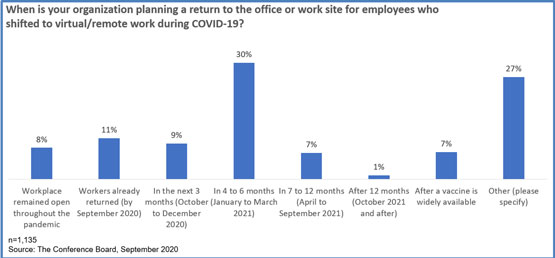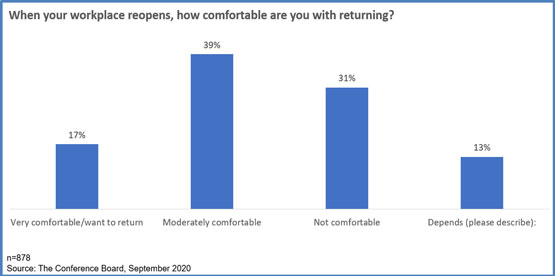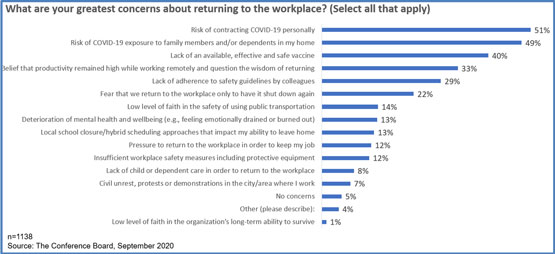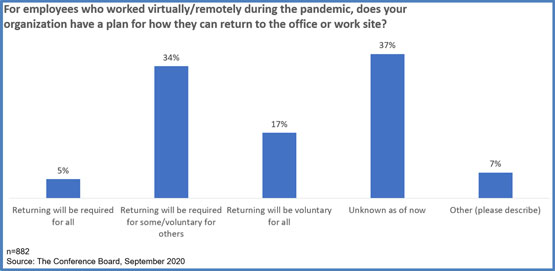Employee Readiness Reopening Survey: Only 28 Percent of Workers Expect Return to Workplace by End of 2020
19 Oct. 2020 | Comments (0)
—More anxiety in the lower ranks: Feel least comfortable with returning, yet most pressure to return to keep job—
—Remote work gains steam: 33 percent question the wisdom of returning, report high productivity while working remotely—
—Women more concerned: Feelmore pressure to return to keep job, more worried co-workers won’t follow safety precautions—
—What’s your company’s reopening plan? A plurality says plan remains unknown as of now—
As new COVID-19 cases continue rising, a survey of US employees finds that only 28 percent expect returning to the workplace by the end of 2020.
The Conference Board survey also reveals that some groups feel more pressure to return than others. To keep their jobs, women feel more pressure to return to the workplace than men. It is an expectation also more greatly felt among more lower-ranking employees: 20 percent of individual contributors feel such pressure, compared to just 4 percent of C-suite executives. And while individual contributors feel the most pressure to return, they also feel the least comfortable with returning.
Conducted between September 16th–25th, the online survey polled more than 1,100 US workers, representing a cross-section of people across industries. Key findings include:
Only 28 percent expect to return to the workplace by the end of 2020.
- Another 38 percent expect to return at some point in 2021 or beyond.
- Widespread vaccination isn’t a guiding factor:Only 7 percent expect to return after a vaccine is widely available.
Only 17 percent feel very comfortable returning – and even want to return.
- 70 percent indicated they are only moderately comfortable returning, if at all.
- Moderately comfortable: 39 percent; Not comfortable: 31 percent.
Lower-ranking employees are more concerned than senior leaders about returning.
- Returning to preserve their jobs: Individual contributors (20 percent) and front-line managers (21 percent) are most likely to feel pressure to return to keep their jobs. Only 4 percent of C-Suite executives feel the same.
- Comfort level with returning:While individual contributors feel the most pressure to return to keep their jobs, they also feel the least comfortable with returning (42 percent vs 31 percent overall).
“These survey results reinforce the need for employers to hear concerns about the pressure that individual contributors and front-line managers, especially, feel to return to the workplace to keep their jobs. These cohorts are less likely to be involved with planning the return. Without a continuous dialogue, and in many cases, the lack of a detailed plan about returning to the workplace, it comes as no surprise that these workers are more apprehensive,” said Rebecca Ray, PhD, Executive Vice President of Human Capital at The Conference Board.
Women are slightly more concerned than men about various aspects of returning.
- Compared to male respondents, women said they:
- Feel more pressure to return to keep their jobs (men: 10 percent; women: 17 percent).
- More concerned with the risk of personally contracting COVID-19 (men: 61 percent; women: 67 percent).
- More concerned with a lack of adherence to safety guidelines by colleagues (men: 32 percent; women: 39 percent).
With productivity high at home, many workers question the wisdom of going back.
- 33 percent believe productivity has remained high while working remotely and question the wisdom of returning.
- Women are more likely to believe productivity remained high while working remotely (men: 36 percent; women: 46 percent).
Will co-workers take proper precautions when returning? There is a trust gap.
- 29 percent of respondents have little faith in their colleagues’ ability to adhere to safety protocols and guidelines.
Top employee concerns: contracting COVID-19 personally, exposure to family, and lack of a vaccine.
There is no one-size-fits-all reopening plan. A plurality says a plan remains unknown as of now.
- Other/please describe: Of the 7 percent who indicated this option, most comments focused around having a phased approach, a rotation model, or different guidelines for different employees.
Note: Whereas this survey gauged employees about their various concerns related to reopening, the previous survey asked respondents about the reopening-related steps that their companies are and plan on taking. Read the results of that previous survey here.
About The Conference Board
The Conference Board is the member-driven think tank that delivers Trusted Insights for What’s Ahead®. Founded in 1916, we are a non-partisan, not-for-profit entity holding 501 (c) (3) tax-exempt status in the United States. www.conference-board.org
-
About the Author:Rebecca L. Ray, PhD
The following is the bio of a former employee/consultant Rebecca L. Ray, Executive Vice President, Human Capital, is a member of the Executive Committee and led the US Human Capital Center for The Co…
-
About the Author:Amy Lui Abel, PhD
Amy Lui Abel, PhD, is a Human Capital Strategist that applies analytics and research to execute business goals. She currently serves as Head of Career Strategy and Experiences at Arch Insurance Group,…
-
About the Author:Robin Erickson, PhD
Robin Erickson, PhD, is Head of Human Capital Research at The Conference Board and leads the development of research insights across all functions of human capital. Previously, she was Vice President …
-
About the Author:Amanda Popiela
The following is a biography of former employee/consultant Amanda Popiela was a Researcher, Human Capital at The Conference Board. She conducted research in a variety of topic areas including talent …








0 Comment Comment Policy